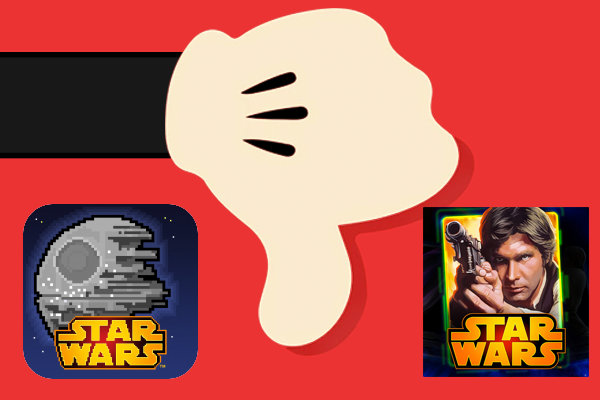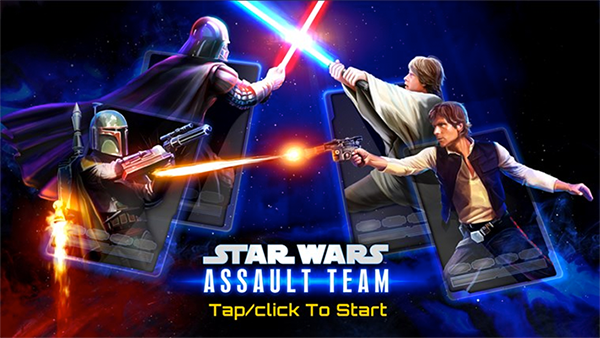Disney Blowing Up Star Wars Games Sets Dark Precedent
Disney pulling popular Star Wars games from mobile app stores is symptomatic of a much more sinister problem in online gaming.


Do you enjoy playing the Star Wars games Tiny Death Star and Assault Team? Not anymore you don't. Disney, which owns the rights to those games, pulled them from Apple's App Store and the Google Play Store on Oct. 6 without so much as a word of warning to the games' developers, to say nothing of its players. The sad fact is that if you play online games, they're going offline sooner or later, and when they do, you'll feel like you might as well have tossed all the money you invested in them down the nearest sewer.
In an age where online connectivity is more integrated than ever, it doesn't matter whether you play massively multiplayer online (MMO) games, casual titles or even single-player adventures: Someday, the servers which power that experience will go offline and the game you paid for is going to either stop working or lose major functionality.
Disney's actions were unusually cavalier, but there was no legal wrongdoing involved. Publishers have every right to pull the rug out from under developers and customers, and there's not a whole lot either can do. The history of online gaming has been one of players investing big and winding up with nothing to show for it.
A galaxy far, far away
The incident that sparked this discussion involved the House of Mouse and two rather unassuming casual games. On Oct. 6, Star Wars: Tiny Death Star and Star Wars: Assault Team disappeared from Apple and Google's app stores. Disney, which owns the rights to Star Wars, neglected to inform the games' developers of this, at least one of which derived a significant chunk of profits from having a Star Wars game under its belt.

For those who never played them (and now, probably, never will), Tiny Death Star was a Star Wars-themed clone of Tiny Tower: a construction game where you customize a building and attract businesses to it. Assault Team was a competitive card game that let you recruit famous characters to take on story challenges and other players. Both were free-to-play, supported by microtransactions and required online connectivity to access the full breadth of content.
(It's also worth noting that, at the time of writing, both apps are still available in the Microsoft Store for Windows 8 devices. This may change soon, unless it's the herald of a clandestine Disney/Microsoft deal.)
MORE: Best Gaming Keyboards 2014
Disney spoke to Game Informer about shutting the two games down, and revealed that the games were pulled because it wants to focus its attention on the Clash-of-Clans-inspired Star Wars Commander. There's no indication that either Tiny Death Star or Assault Team were unprofitable, and both were popular among fans and critics.
Players who already own the games will be able to continue playing them indefinitely, although the online components — such as purchasing in-game currency or competing against other players — will be gone soon, if they haven't disappeared already. Tiny Death Star was less than a year old.

Without consulting the games' fan bases, or even the games' developers, Disney pulled two well-liked games. The apps disappeared not because they were losing money or because they were reviled, but because Disney just liked another game better. Even if Disney never pulls such a move again, it's now set a precedent: your favorite games can disappear, and for no reason whatsoever.
Sunrise, sunset
Although Disney's example is extreme, games disappearing forever is nothing new. MMO gamers are uniquely familiar with the idea that their progress can be shut off at any time. Save for extremely popular titles like World of Warcraft, all MMOs eventually go to the digital equivalent of Sugarcandy Mountain — even if they're extremely popular or profitable. It's called sunsetting.

Go ahead and ask Star Wars Galaxies, City of Heroes or Doctor Who: Worlds in Time how much having passionate fans, respectable earnings and unconventional gameplay systems helped them in the long run. The fact of the matter is that companies can and will shut down MMOs at the drop of a hat. They take forever to produce, they're expensive to maintain and they face extremely stiff competition in a market that's still saturated by World of Warcraft.
MMOs cost players money both through subscription fees and microtransactions. While some are "free to play," many MMOs require players to pay monthly fees on top of the initial cost, often as much as $60, for the game. Microtransactions allow you to purchase cheap in-game items: often cosmetic changes or currency to speed up gameplay. Over the years, a player might spend hundreds of dollars on a game and be left with nothing but good memories.
In Age of Empires Online, for example, players could spend between $10 and $20 on purchasing playable civilizations piecemeal. By the time all the civilizations were available, this was not terribly different from buying a brand new Age of Empires game for $50 up-front. However, when Age of Empires Online went dark in July 2014, that money vanished into thin air.
You can grab literally any Age of Empires game that came before it today and, with a little finagling, get it to run in either single-player or multiplayer modes on a modern machine. But you can never play Age of Empires Online again, no matter how much time and dough you sank into it.

Not everything you spend money on has to last forever, of course — food comes to mind. But buying a video game should feel like owning a piece of your favorite hobby, not continually feeding a traffic meter until the meter sinks into the bowels of the Earth and takes your car along with it.
Single-player shenanigans
Even if you prefer solo adventures to multiplayer games, the impermanence of online connectivity is coming for you, and might even give you the shorter end of the stick. Single-player games are more dependent on online play than they've ever been. Two recent titles demonstrate this concept: Shadow of Mordor and Destiny.
Shadow of Mordor has story missions, side quests and collectibles, but its biggest draw is its vaunted Nemesis system. This allows players to confront orcish warchiefs as the warchiefs organically grow stronger and advance through the enemy ranks, but it also grants the game a bit of multiplayer. If a warchief kills a player on your Friends list, you can avenge him or her, and thus add his Nemesis to your own game, granting valuable experience and items. The game will still be functional if and when this system goes offline, but you'll still be getting a compromised experience.
Destiny is perhaps an even worse case. The title skirts the line between single-player shooter, multiplayer shooter and MMO shooter as is. Someday in the distant future, when we all have real Ghost robots of our own, the servers that support Destiny will go down, and players will be left with single-player missions and no opportunity to band together. This may gate off some of the content permanently.
Losing Destiny would be bad enough, but the game is also supposed to kick off gaming's next big IP. What will players do once they can't follow the story from the beginning? If it's literally impossible to go back to the source and start from scratch, Destiny players will either have to have been fans from the beginning, or willing to rely on secondary sources for the story.
Consider, too, games like Demon's Souls and Dark Souls. These ultra-difficult action/role-playing titles help players overcome their intense challenges through clever online features. Players can communicate with each other via cryptic messages, observe each other's fatal mistakes by examining blood spatters and even team up to conquer the game's massive bosses.
Once the servers go down (as those in Demon's Souls have already threatened to do a number of times), it will still be possible to complete the games, but the soul of the experience will be gone. Without the aspect of cooperation (and occasional antagonism of invading other players' games), the games will feel much more difficult, empty and predictable than they are right now.
A vanishing history
The most important book in the history of literature is arguably The Epic of Gilgamesh; ditto for film and The Great Train Robbery. Go online right now, and you can read the former and watch the latter. While many books and films have disappeared over the years, you can at least consume just about anything that's survived.
Not so with video games. The problem with video games is that they're tied to specific systems. You can't play Tennis for Two, the first-ever video game, because it was programmed on a 1950s U.S. Navy oscilloscope. Nintendo has been good about re-releasing Super Mario Bros. on just about every one of its consoles, but needing to own a Nintendo console is not quite the same as being able to simply read or watch something. This is to say nothing of the shady emulation scene, or games that aren't as popular as Super Mario Bros.
MORE: 15 Best Mobile RPGs
The point is that gaming already has a significant problem preserving its most important titles for future generations, and locking single-player content behind online walls is only going to exacerbate it. Demon's Souls, for example, is one of the most creative and unconventional role-playing games of the last console generation. How will future design students learn from it when it plays like a masochistic grind rather than a subtly cooperative quest?

Games like Age of Empires Online, City of Heroes and Tiny Death Star are already lost to history. Destiny, Shadow of Mordor and Dark Souls will be severely compromised experiences a few years from now, whereas old Gilgamesh is still kicking around just fine after three millennia.
Disney taking down two casual games is not likely to make a big impact on the history of gaming, but publishers must remember that they are also custodians of something precious. Pulling titles down or shackling them with company-server-based online features may be profitable in the short term, but almost ensures that the games — and what they have to teach us — will scarcely outlast their time on the shelves.
Marshall Honorof is a Staff Writer for Tom's Guide. Contact him at mhonorof@tomsguide.com. Follow him @marshallhonorof and on Google+. Follow us @tomsguide, on Facebook and on Google+.
Sign up to get the BEST of Tom's Guide direct to your inbox.
Get instant access to breaking news, the hottest reviews, great deals and helpful tips.
Marshall Honorof is a senior editor for Tom's Guide, overseeing the site's coverage of gaming hardware and software. He comes from a science writing background, having studied paleomammalogy, biological anthropology, and the history of science and technology. After hours, you can find him practicing taekwondo or doing deep dives on classic sci-fi.

